|
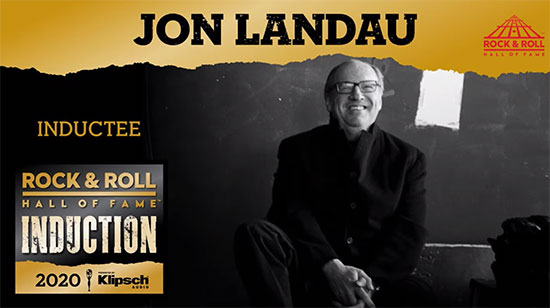
It has to be said, just this once: We saw Rock and Roll Hall of Fame Future, and its name is Jon Landau.
Tonight.
When Bruce Springsteen was inducted into the Hall in the spring of 1999, he had words of deep gratitude for each of his comrades-in-arms in the E Street Band, but perhaps none as rich as those he saved for his longtime manager and friend:
Jon's given me something beyond friendship and beyond guidance: his intelligence, his sense of the truth, his recognition of my intelligence. His creative ability as a producer and editor… his ability to see through to the heart of matters, both professional and personal, and the love that he's given me has altered my life forever. What I hope to give to my fans with my music — a greater sense of themselves and greater freedom — he, with his talents and his abilities, has done that for me. There's no "thank you" tonight that's gonna do the job, and it's a debt that I can't repay — and one I treasure always.
In 2014, Springsteen delivered the speech to welcome the E Street Band into the Cleveland-based institution; tonight, in the 35th annual Induction, he will lead the Rock Hall in honoring Landau himself.
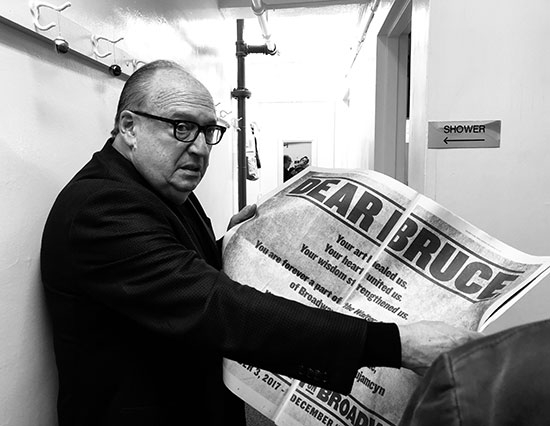
Landau's induction into the Rock and Roll Hall of Fame comes in the form of the Ahmet Ertegun Award. Named for the esteemed co-founder and president of Atlantic Records (as well as co-founder and chairman of the Rock Hall itself), the honor is one Landau will share with such towering previous inductees as Frank Barsalona, Clive Davis, Brian Epstein, Leo Fender, John Hammond, Jac Holzman, George Martin, Sam Phillips, and his old friend Jann Wenner.
The Ahmet Ertegun Award award honors "industry professionals," those outside the performance arena — songwriters, producers, managers, journalists, inventors, disc jockeys — "who have had a major influence on rock and roll." Over his nearly 60-year career (and counting), Landau has not only pursued three of these professions — critic, producer, manager — he's climbed to the top of each field.
In an exclusive interview with Backstreets, Landau confirms this trifecta as the basis for his Rock Hall induction: "I've come to understand that the powers that be who provided me with this honor were looking at three things. My journalism and the leadership role I had in the development of rock criticism was a component, in addition to my production work and my approach to management, which was pretty unique. My career has ranged over some very diverse territories and turfs."
For all the impact he has had on Springsteen's worklife since the mid-'70s, Landau could be honored solely for his accomplishments prior to even meeting the Boss. His trailblazing work and influence in the new field of rock criticism alone would merit such an award.
"I think that that is close to the truth," Landau admits, while still rightfully regarding his 45 years with Springsteen as "a phenomenal lifetime accomplishment."
Landau's work as a producer stands tall, including early efforts with Livingston Taylor and proto-punk legends MC5. Each happened before we even get to what is arguably the greatest decade-long run of album releases in the rock era: Born to Run, Darkness on the Edge of Town, The River, Nebraska, and Born in the U.S.A. Today, Landau has not only multi-platinum-album production credits to his name, but film and theater production, too, including the hottest ticket on Broadway in 2017 and 2018.
As to management: witnessing Springsteen navigate worldwide fame and its pitfalls in the decades following Born to Run, embracing new challenges with consistently vital new work… the results, with managerial partner Barbara Carr, practically speak for themselves.
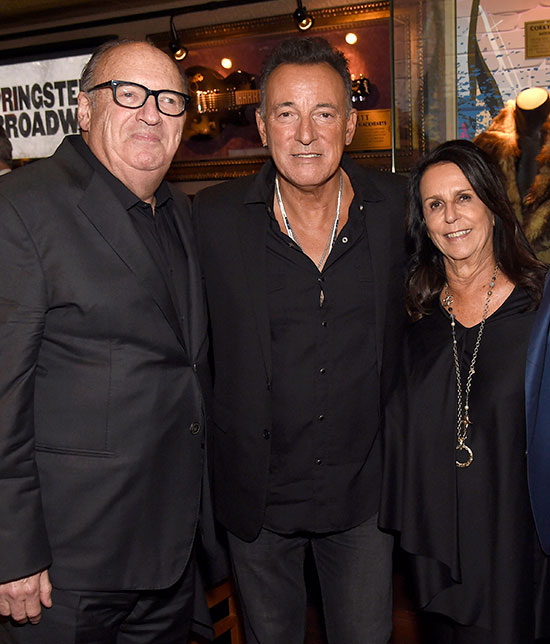
At the Walter Kerr Theatre, managers Jon Landau and Barbara Carr with a longtime client
Landau explains how he experiences his different roles with Springsteen: "Creativity is the glue of our relationship. That's where it came from. It expressed itself first with me as producer, a very hands-on, involved, record producer with him. And then came the management. And the management came out of the fact that we're so involved in the overall project, we were both so committed to it and to each other, that management just felt like a natural extension. It's all one thing. It's not producing, managing, producing the films… it's just all our relationship to me."
While Springsteen fans may have a great sense of their work together since meeting in 1974, Landau's previous accomplishments may be less visible; on occasion of the Rock Hall honor, Landau spoke enthusiastically with Backstreets about his early years.
An avid music devotee since childhood ("I'm going to do that. I want to be like that," he told himself after a Pete Seeger concert, at the age of four), Landau got his first guitar at seven, took lessons, and absorbed everything from folk to rock to bluegrass. He channelled his allowance into 45s. The first record he bought? "I Don't Want to Hang Up My Rock and Roll Shoes," by Chuck Willis — perfectly fitting, considering how active and influential he remains in the field at 73.
Jon obsessed over the Top 40, keeping score on a notepad. "I became this intense chart follower. My other interest was baseball, and I had also become a master of baseball statistics — I loved numbers. I loved charting everything out. I had a notepad, and I'd write down each song and possibly make a number of stars or comments.
"When Chuck Berry put out 'Sweet Little Sixteen,' I just loved that record. My recollection is that on this chart that I used to follow — the radio station's chart, not a Billboard chart — it got to number two.
"So I was waiting for the next week," Landau continues, "because I was sure it was going to number one. I got invested in these artists — you were invested in these records, and you personally wanted them to go to number one. That meant something to you, you know? But it didn't. It didn't hit number one. 'What the…? What went wrong here? What's the matter with these crazy people? How could this not be number one?'"
Landau doesn't mention chart-watching "Dancing in the Dark" some 25 years later; he doesn't have to.
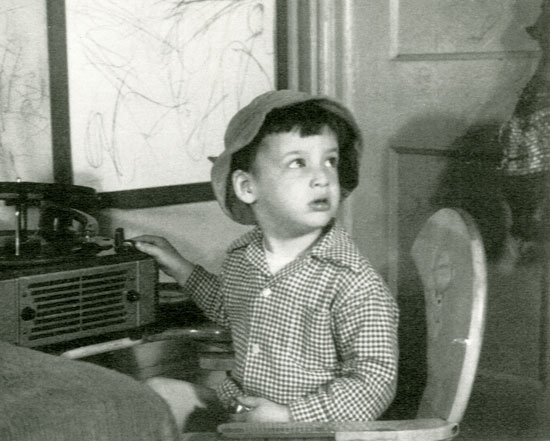
Born in 1947, Landau was there for the birth of rock 'n' roll — as well as, more directly, the birth of rock criticism, becoming a vanguard in the field. His career as a rock critic began in the early '60s, when he was still in high school and venues for such writing were fledgling at best.
"There were a couple of very basic, mimeographed, or simply printed handout-type magazines that would have reviews or commentary about the artists that were playing this month, that sort of thing. I had run into the editor of one of those publications and said, 'You know what? I could write about so-and-so.' I volunteered. So I wrote a few reviews when I was a junior in high school for one of the prototypes of early good music magazines."
His love of bluegrass led to Landau learning banjo in addition to guitar, and soon he was playing in a band and giving lessons — earning money that he funneled back into records. In the summer of '63, just before starting college, he took a job at Cambridge, Massachusetts music store Briggs & Briggs, in Harvard Square. Briggs & Briggs was "half popular music and half classical music, and I was in charge of the popular music," Landau says. "I was like the boy wonder in there." That's where he met Paul Williams, who founded Crawdaddy! prior to the birth of Rolling Stone on the opposite coast.
"Paul would bring Crawdaddy! around and ask me, 'Can I put it by the cash register?' We didn't have any magazines in the store; he would ask me if we'd carry it, and help him make a few bucks to help keep the thing going. And he did this with all the stores in town."
"I believe I can say Crawdaddy! was the first serious publication about rock music," Landau adds. "It was written by intelligent people. It was not written from a 'teen star' or even a fan point-of-view. It was just written by people who loved music and had a serious take on it. It could be very pretentious — it could be all kinds of things — but it was serious about music."
That resonated with Landau, who eventually agreed to sell the magazine, read it himself, and soon made Williams an offer — or a challenge. "Paul was a sort of contentious guy, and I was a bit of a contentious guy, myself. So he comes in one month, and I said to him, 'Let me tell you something. I can write circles around everybody in this magazine, including you. Okay? So why don't you give me a chance?'" And I started my career as a journalist."
Soon at Brandeis University, Landau started his college band — The Jelly Rolls, with his friend and songwriting partner Tom O'Connell — while writing rock reviews for the campus paper, The Justice, and freelancing for numerous other magazines. Most of those mags are long-gone by now, but there was one that would stick around.
"In 1967," Landau recalls, "I got a letter from Jann Wenner in San Francisco, who I had never met and never heard of. He was starting a new magazine, and he wrote me this very flattering letter about how much he enjoyed my writing. He sent me this dummy issue, to show what the magazine is going to look like. And it looked fantastic. There had never been anything like it. He said, 'I want you to be my lead music critic. You'll have the whole page every issue. You can write about whatever you want.' And he added, 'Unlike the rest of these characters that you've been writing for, I will pay you.'
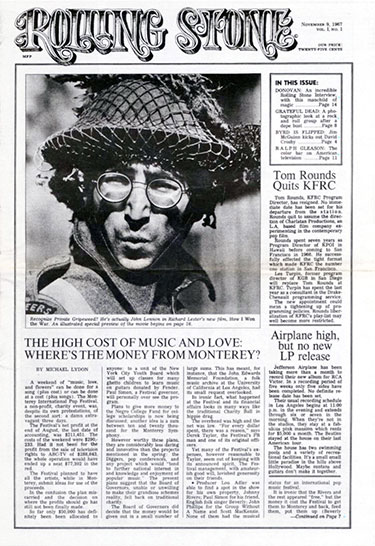 "Twenty-five dollars an article — a raise from zero, which is what rock critics generally got paid. And so for the next 10 or 11 years, that's what I did. I wrote for Rolling Stone." "Twenty-five dollars an article — a raise from zero, which is what rock critics generally got paid. And so for the next 10 or 11 years, that's what I did. I wrote for Rolling Stone."
So while Bruce Springsteen was still playing with the Castiles, Landau was helping get Wenner's new venture off the ground (Rolling Stone, of course, still publishes today, with 1,345 issues and counting). He reviewed Jimi Hendrix's Are You Experienced for the magazine's debut issue [right] while still a junior at Brandeis — and still writing rock reviews for The Justice. "That's where I initially wrote this very harsh review piece about Cream — I would try things out in The Justice. That would be the first version, and then I'd rewrite them for Rolling Stone."
As a groundbreaker in rock criticism — "I was not a reporter, I was a critic," he emphasizes — Landau had few peers, but he speaks of them generously and fondly. "We were just making it up as we went along," he recalls. "There were great, great writers like Greil Marcus, and Paul Nelson. And then, of course Lester [Bangs] comes into it, and Dave Marsh comes into it, and Ellen Willis was a great voice at that period. Lenny Kaye was a great writer, before he came to work with Patti Smith. Richard Goldstein at the Village Voice was a pioneer, and Bob Christgau, who still does it today — he's probably the most dedicated, and he just embraced the identity of being a rock critic to the fullest. They're all wonderful writers, and looking back, they're all wonderful people. All contributed, and there are so many I'm not mentioning."
As prolific as his future managee would prove to be, Landau himself became "the most widely read and the most influential rock critic at that point in time, I think it's fair to say. I published a vast amount of material between the mid-'60s and the mid-'70s. I was prolific. Between things I wrote locally, or for different publications that came and went — there was a magazine for a while in Boston, Vibrations — and Rolling Stone. And The Justice, and The Phoenix, where I appeared regularly."
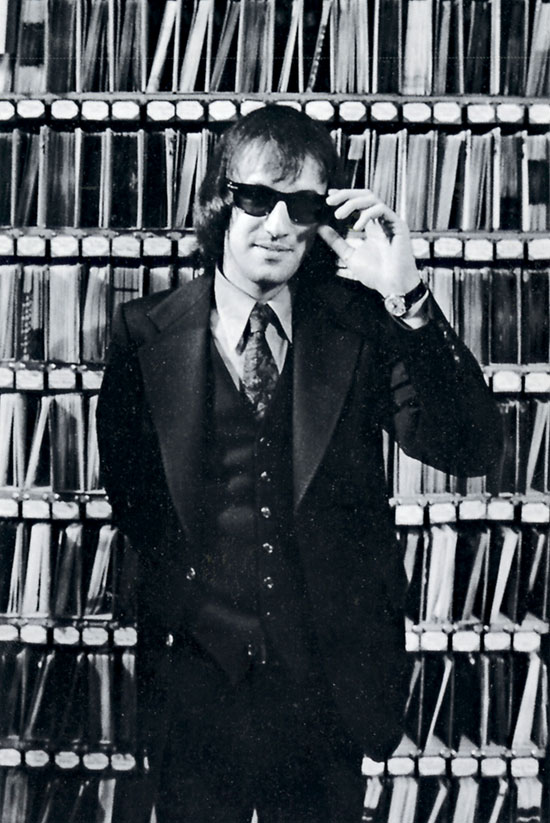
Rolliung Stone's lead music critic with the Rolling Stone archives
Landau hung up his critic's hat around 1977, around the time he was producing Jackson Browne's The Pretender and taking on the management role with Springsteen, but prior to that he was writing "all the time. I wrote hundreds of thousands of words before I stopped writing in the late '70s. I mean, volumes." (There is one literal volume: selected writings were collected in a 1972 book, his long-out-of-print It's Too Late to Stop Now. When I mention my copy, he says I must have "one of ten in existence," but it's not quite that rare — it's worth seeking out used.)
"I see things [I wrote] every now and then online, or somebody sends me something and I can't even remember having written it," he laughs.
Does it seem like a lifetime ago?"
"Oh, I don't think of it that way. It seems like it was part of life. And lest I be misunderstood, I'm extremely proud of what I did contribute as a pioneer in writing about rock music. And I'm very glad that the Hall of Fame, and the material that they used to announce this, has paid great attention to it as part of the reason why I'm being honored."
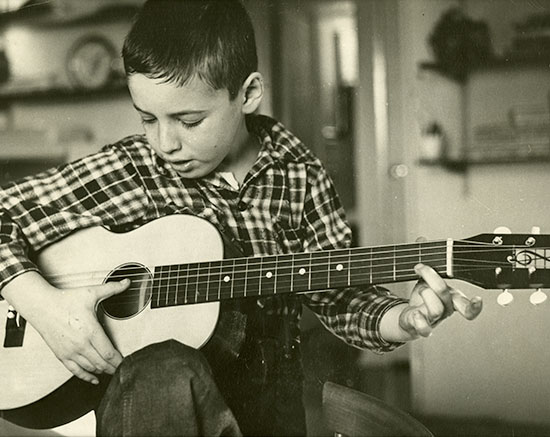
As he tells it, Landau's transition from the written word to the recording studio was a natural, gradual one. "I always had an interest in going over to the other side, getting involved. And the more I wrote, the more I learned, I began to give up on playing myself. Because I made a determination that, as much as I enjoyed it, I wasn't going to be great. I was very good; I could have played rhythm guitar very nicely in many bands, and I was an okay lead guitar player… but I was not going to be Eric Clapton. I was not going to become known for my guitar playing.
"But being very observant as a listener, and having listened to so much, I started to gravitate toward learning about who are all these people who are called producers. What did they really do? Who are these engineers? I still played for pleasure, but dreams of being in a rock band, playing myself? Instead I became interested in getting into the production side. "
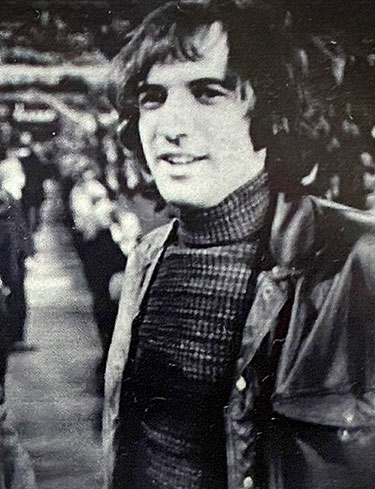 It wasn't long before labels would come calling to grant him the opportunity. Due to how well-known he'd become as a reviewer, and his influence as a critic, Landau "had record company executives and promotion men calling me in my little off-campus apartment that I shared with a roommate." It wasn't long before labels would come calling to grant him the opportunity. Due to how well-known he'd become as a reviewer, and his influence as a critic, Landau "had record company executives and promotion men calling me in my little off-campus apartment that I shared with a roommate."
And not just any record execs: "I pick up the phone and some woman — very official-sounding — says, 'Mr. Landau, would you hold the line for Mr. Jerry Wexler?'"
Another monumental music writer (he coined the term "rhythm and blues") who became a producer (and a fellow Ahmet Ertegun Award recipient), the late Wexler came to prominence as a partner at Ertegun's Atlantic Records, signing and producing Aretha Franklin, Wilson Pickett, and Ray Charles, to name just a few. Not a bad call to take as a college kid.
Then there was Elektra Records founder Jac Holzman, who hired Landau as a consultant, opening the door for his first production job.When Bruce Springsteen was still in Child, before forming Steel Mill, Landau was producing the MC5.
And here's how rock 'n' roll Jon Landau is: "On my graduation day in 1969 from Brandeis, instead of being at my ceremony, I took a plane to Ann Arbor and moved into [the MC5's] communal house that they had, for the five guys and their wives and/or girlfriends, and stayed there for four straight months and made the record Back in the USA."
"I love the record, to this day," he says. "There were three people in the MC5 who were phenomenally talented. They were all great guys, but Rob Tyner, the singer, Wayne [Kramer], and Fred 'Sonic' Smith, they were just sensational.
"The MC5, for whom I'm a great advocate, should be in the Hall of Fame," says Landau, who helped steer the 35-year-old institution since its second year, serving on the Rock Hall board and chairing its nominating committee. "Listen, you know my role there, and that band is conclusive proof that I do not have the ability to push a button and put somebody in."
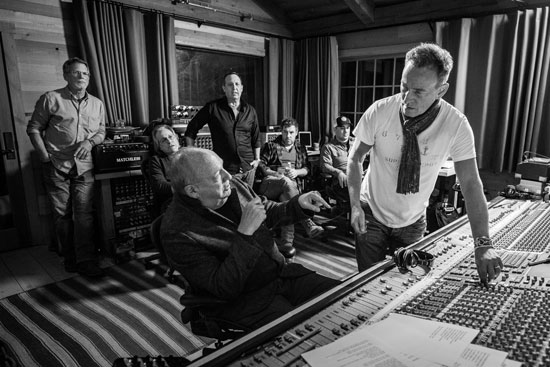
Still creating after all these years: Landau and Springsteen during the 2019 Letter to You sessions
Landau first heard of Bruce Springsteen when Lester Bangs reviewed Greetings From Asbury Park, NJ, for Rolling Stone — "a crazy Lester Bangs review. You sort of have to read it a couple of times to figure out: does he like this record, doesn't he like this record? It was just Lester being Lester."
In 1974, Landau and Springsteen met, outside Charlie's Place in Cambridge. From this point on, so much of the story is well-documented, whether in memoirs and bios like Peter Ames Carlin's Bruce, Dave Marsh's Born to Run or Springsteen's own; in documentaries like Wings for Wheels; and Backstreets Publishing's own book Bruce Springsteen: Rock and Roll Future, which focuses on "the quote heard round the world" and the night Landau famously wrote about in the Real Paper.
Of that column, titled "Growing Young With Rock and Roll" (which features the immortal line "I saw rock and roll future and its name is Bruce Springsteen"), its author remains "very proud."
"There were times, early on, when I felt self-conscious about it… I'd really gone overboard, really stuck my neck out. But as time passed, I just had nothing but good feelings about what I wrote there — and it was just the truth. It was the best I could do, it was from the heart, and I would write it again tomorrow in a heartbeat."
"That night, when I went home and wrote the article," he adds, "I think I said to myself, 'What I want to do more than anything is find a way to work with this guy.' Work with him — I didn't know what that meant. I could get a job at Columbia Records and be an A&R man, I could… you know, it could be anything, but I just knew that that's where I wanted to go. And so, I had that direction from that point on."
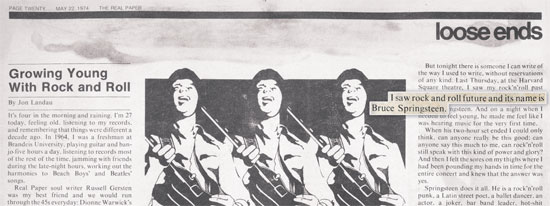
"Growing Young With Rock and Roll," Landau's famous 'Loose Ends' column for May 22, 1974, as shown in Bruce Springsteen: Rock and Roll Future
It's worth noting that, after that 1969 flight to Ann Arbor kicked off a 50-year career in the music business, Landau did eventually receive his college diploma.
"Last year I was given, of all things, an honorary degree by my alma mater, Brandeis University. You go up there for the weekend, you have a cap-and-gown ceremony and some other very nice events… you get to address the graduating class, be part of it. And it sort of snuck up on me. At first I thought, 'That's nice,' so I said yes. And then when I got there, it felt like a big deal. It was a big deal for me. And it took me a little by surprise. I was so pleased… and I finally got my diploma."
"Awards are funny things," says Landau. "I haven't had that many. And I tend to discount them a little."
But he's clearly deeply honored by tonight's. The COVID pandemic has required a different approach to this year's Induction Ceremony, postponed from the spring and now airing as a film produced by Joel Gallen. "They could not do a live event, just for the obvious reasons… so I've already done my speech," he says with a laugh. "It's already been filmed. But it gives us all a chance to accept our awards. And so I am looking forward to the air date and everybody else seeing it.
"Thom [Zimny] did a documentary on myself" — apparently a six-minute film within the broadcast — "and it was very gratifying. All the people who spoke in it or contributed to the documentary, including but not limited to Bruce, were superb. And I'll watch it in real time, as well. I haven't seen the rest of the film."
But that means he has seen the induction speech delivered by his old friend, who's known for some of the greatest — funniest, most insightful, most quotable, deeply thoughtful — speeches in Rock Hall history?
"Yes," says Landau. "It was… satisfactory."
The understatement, and the appreciation, is clear.
We'll all have a chance to see it tonight, as HBO and HBO Max air the 2020 Rock & Roll Hall of Fame 2020 Inductions, starting at 8 pm Eastern. From everyone at Backstreets, we send our congratulations to Mr. Landau, Rock and Roll Hall of Famer, with heartfelt gratitude for his lifelong devotion to the cause.
- November 7, 2020 - Christopher Phillips reporting - thanks to Thom Zimny, Ali Oscar, and Jon Landau Management for the photographs
|






